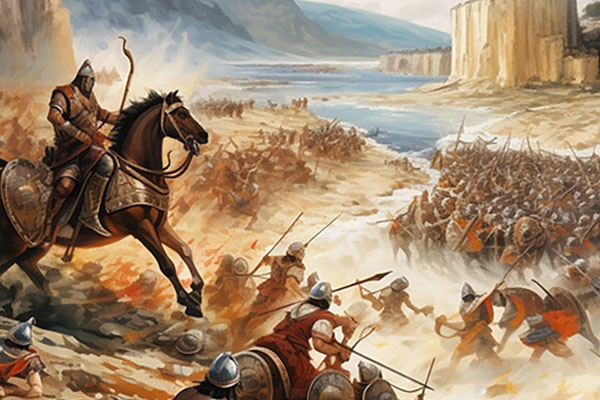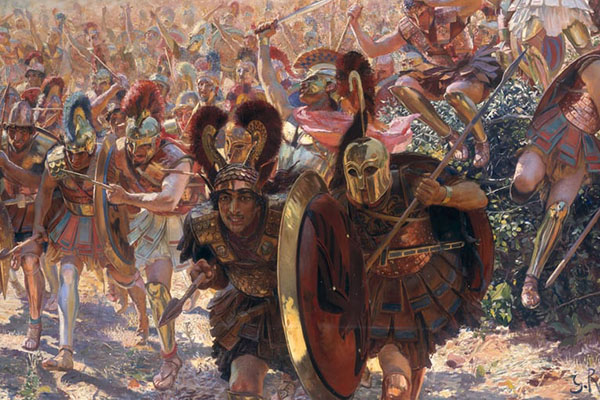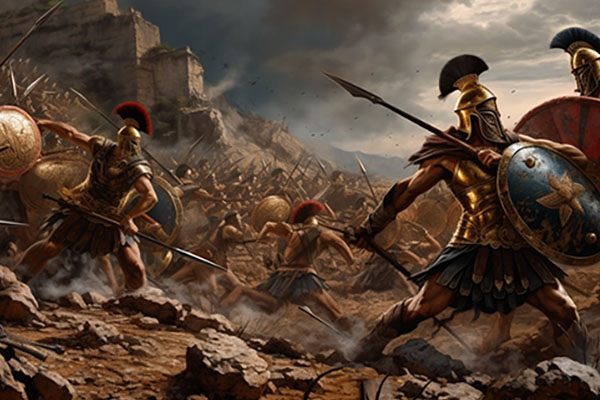Led by Mardonius, the first campaign successfully re-subjugated Thrace and made Macedon a Persian client kingdom. However, progress was hindered when Mardonius' fleet encountered a storm off Mount Athos. Despite this setback, Darius, having received submission from most Greek city-states, faced resistance from Athens and Sparta.
I. Prelude to Conflict: The Peloponnesian War, spanning from 431 BC to 404 BC, was a significant ancient Greek conflict between Athens and Sparta, along with their respective allies. The central struggle revolved around the quest for hegemony in the Greek world.
II. Unsettled Warfare: The war remained in a state of uncertainty for a prolonged period until the pivotal intervention of the Persian Empire, aligning with Sparta. Under the leadership of Lysander, the Spartan fleet, financially supported by Persia, ultimately defeated Athens, ushering in a period of Spartan dominance over Greece.
III. Three Phases of Strife: Historians traditionally segmented the war into three phases. The first, from 431 BC to 421 BC, known as the Ten Years War or Archidamian War, featured strategic invasions by Sparta's Archidamus II and the effectiveness of Athens' Long Walls. The Peace of Nicias in 421 BC marked a temporary halt until 413 BC.
IV. Sicilian Expedition and Proxy Battles: The Peace of Nicias saw proxy battles, including the Battle of Mantinea in 418 BC. Notably, the Sicilian Expedition (415–413 BC) resulted in a naval disaster for Athens, severely impacting its navy and strengthening Sparta's position.
V. Persian Support and Spartan Victory: The third phase (413–404 BC), named the Decelean War or Ionian War, saw Persian support for Sparta. Lysander's fleet achieved decisive victories, notably at Aegospotamos in 405 BC. Athens capitulated in 404 BC, losing its empire. Lysander imposed puppet oligarchies, leading to the Thirty Tyrants regime in Athens.
VI. Reshaping Greece: The aftermath of the Peloponnesian War reshaped ancient Greece. Athens, once dominant, faced near-complete subjection, while Sparta emerged as the leading power. Economic repercussions were felt across Greece, with widespread poverty in the Peloponnese and Athens devastated. The conflict altered Greek society, transforming warfare from a limited form into an all-out struggle between city-states, marked by large-scale atrocities and the end of the golden age of Greece in the fifth century BC.
| Start Date | 431 BC |
|---|---|
| End Date | 404 BC |

Did you
know?
The Peloponnesian War lasted 27 years, shaping the course of ancient Greek history.
Wars
View allALLFurther Reading
Art &
Architecture
Ancient Greek art and architecture, with its harmonious proportions and timeless elegance, continue to inspire awe and admiration millennia later.
Discover
Greek Mythology & Mythical Characters
Greek mythology, a rich tapestry of gods, heroes, and mythical creatures, captivates the imagination with its tales of love, betrayal, and epic adventures that delve into the depths of the human psyche.
Discover
Ancient Greek History
Ancient Greek history, marked by remarkable achievements in democracy, philosophy, and warfare, shaped the foundation of Western civilization, leaving an indelible legacy of innovation and cultural influence that continues to resonate to this day.
Discover
Ancient Greek Olympics
The ancient Greek Olympics, held in Olympia every four years, celebrated athleticism, unity, and cultural pride, serving as a testament to the enduring spirit of competition and excellence that transcends time and borders.
Discover
Ancient Greek Wars
Ancient Greek wars, such as the Persian Wars and the Peloponnesian War, were pivotal conflicts that shaped the course of history, highlighting the struggle for power, independence, and the clash of civilizations in the ancient Mediterranean world.
Discover
Ancient Greek Culture and Society
Ancient Greek culture and society, characterized by its emphasis on art, philosophy, and civic engagement, fostered a vibrant intellectual and social landscape where innovation flourished, democracy thrived, and the pursuit of knowledge and excellence was celebrated as fundamental values of civilized life.
Discover


